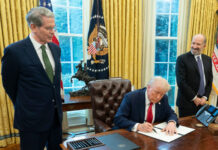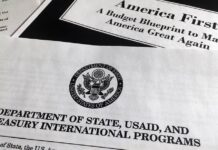It’s now been almost a month since we experienced a Black Friday for UFO/UAP disclosure when the UAP transparency language in the National Defense Authorization Act (NDAA) was gutted at the behest of a handful of Congressional Republicans. Taking the worst beating was the UAP Disclosure Act, a bipartisan Senate measure introduced by Chuck Schumer and Republican Mike Rounds. Yesterday, the NDAA with its watered-down UFO language was signed into law, but the story hasn’t yet been fully told. It turns out that the White House included a signing statement (as usually happens) and Joe Biden’s office included some pointed remarks about the UFO language from the House version of the bill. But it was not a call for greater UAP transparency. In fact, it was quite the opposite. I first saw this detail on the website of the indispensable Douglas Dean Johnson, who tracks all things related to UFOs and the federal government’s involvement with them like a hawk. Biden’s statement only further supports the right of the executive branch to keep anything and everything about UFOs and what the government knows to itself.
In a formal signing statement issued when he signed the NDAA into law on December 22, 2023, President Biden listed Section 1687 as among several provisions of the act that would require submission of “highly sensitive classified information” to Congress. The President said that the Administration will presume a right to comply with these provisions in a manner that it believes protects national security; the signing statement did not specify the nature of those adjustments. Images of the President’s complete signing statement appear at the bottom of this article under End Note [4].
If you have any interest at all in this topic, you should read Dean’s full report at the link, particularly the “update” section added yesterday, starting roughly one-third of the way down the page. The signing statement made little to no mention of the Schumer-Rounds UAP Disclosure Act amendment. The comments about Section 1687 (the House language that was gutted by the GOP) reiterated that the executive branch would maintain “a right to comply with these provisions in a manner that it believes protects national security.”
We all know what that means. ‘We agree the public should have a right to know about these matters. But only if it doesn’t impact “national security.” What does that mean? It means whatever we say it means at any given moment and if you start asking too many questions about it we’ll be checking into what you’re up to.’
I checked with Dean privately and he indicated that there had never been any appetite in the White House for Schumer’s provisions. He told me that no official organ of the White House “ever gave the slightest indication of support for [the Schumer-Rounds amendment] publicly.” He also saw no evidence of any “back-channel” work to support the measure either. After doing a bit more digging, I have to agree. There were some chipper statements from KJP and Defense Department spokesperson John Kirby about how the White House was very “interested” in the UAP topic and “being transparent” with the people, but that’s likely only because they saw the bipartisan support the issue receives among voters.
The bottom line is that we’ve hit a brick wall in the battle between the three branches of the federal government in terms of UAP transparency and disclosure. The legislative branch has been carrying the banner and doing all of the heavy lifting, but all of their work was undermined at the eleventh hour by Speaker Johnson, along with Congressmen Mike Turner and Mike Rogers (“the two Mikes,” as David Grusch calls them). Now we know that the current executive branch is either uninterested in or solidly opposed to transparency on this issue.
The judicial branch likely has little or nothing to say on the matter. Issues of classification and secrecy have rarely if ever landed in their laps. One of the few exceptions included a set of lawsuits regarding investigations into JFK’s assassination, and the courts largely took a pass on that one as well. After all, it has long been accepted that the government has a right (and some might say a duty) to keep certain things secret from the public, such as the details of our nuclear weapons programs or the identities and locations of our spies around the world. The courts have never disagreed.
And those are things that we know exist. We’ve seen the footage of nuclear test explosions. Verified reports of the activities and occasional misbehavior of our spies along with those of our allies and adversaries pepper the annals of history. So what about the possibility of our government having technology and/or biological remains of some nonhuman intelligence? Plenty of people are talking about it, including many former and current senior officials in the intelligence community and the military. They’ve apparently demonstrated this to members of Congress sufficiently well that Chuck Schumer included the phrase “nonhuman intelligence” in the UAP Disclosure Act two dozen times. But those are all still just words. And that’s likely all they will be until someone wheels out a Tic Tac on a flatbed trailer or Skinny Bob shows up on 60 Minutes to give an interview. What are the courts supposed to do with that?
In the end, the real problem with this process of potential disclosure isn’t the Republicans in the House who are fighting it (likely at the behest of their handlers in the intelligence community and the aerospace industry that hold their financial leashes), the three-letter agencies, or even the Pentagon. The problem is the President. As the head of the executive branch and, by default, the military, he has the right to declassify anything he likes with the stroke of a pen. He could review any UAP documents, photos, or videos, with or without a civilian advisory panel, and order them to be declassified and released. And if even a fraction of the bombshell claims made by UFO whistleblower David Grusch are true, there would be plenty to release. But that’s obviously not happening. Whether it’s somehow Biden himself or his current team of handlers, the decision has been made. You don’t need to know about what could potentially be the most startling revelation in the history of mankind because they say you don’t need to know. So the fight for transparency continues forward at a maddeningly slow slog.




